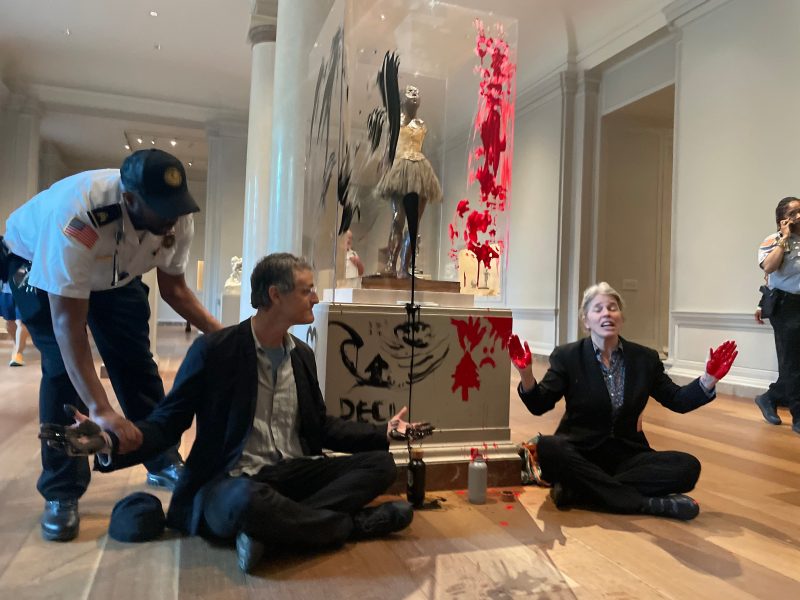Two climate activists were indicted by a federal grand jury following an April protest that included smearing paint on the case protecting Edgar Degas’s “Little Dancer Aged Fourteen” sculpture in the National Gallery of Art, the U.S. attorney’s office in Washington said Friday.
The climate activists — identified in the recently unsealed indictment as Timothy Martin and Joanna Smith — surrendered to officials on Friday on two counts related to conspiracy and damaging property in the National Gallery of Art, according to a news release from federal prosecutors. Each charge carries a maximum of five years in prison and up to a $250,000 fine.
At the time of the incident, the climate group that organized the stunt, Declare Emergency, identified the protesters as Smith, 53 of New York, and Martin, 54, of Raleigh, N.C.
Federal authorities allege Smith and Martin concealed paint in plastic water bottles before smearing it on the case, base and floor surrounding the sculpture, resulting in $2,400 of damages. The gallery had to remove the exhibit for repairs afterward, according to a news release.
The indictment also accuses Martin and Smith of working with unknown co-conspirators to carry out a plan, which included researching “potential targets” in the National Gallery of Art, telling “at least one member of the media” about their plans, and documenting Smith and Martin smearing paint.
Following the incident, Kaywin Feldman, the director of the National Gallery of Art, released a statement condemning the protest.
“We unequivocally denounce this physical attack on one of our works of art and will continue to share information as it becomes available,” Feldman said in the statement.
Attorneys representing Smith and Martin said their clients never aimed to damage artwork, but rather hoped to use art to draw attention to the climate crisis.
“This was not trying to destroy priceless art. This was not trying to damage the property of the federal government,” said Phil Andonian, an attorney representing Smith. “It was really about getting a vital message out to the public and amplifying it.”
Mark Goldstone, an attorney representing Martin, called the protest both a “provocative tactic” and “nonviolent civil disobedience.”
On April 27, Martin and Smith approached the sculpture and used paint to draw images at the base. Smith used red paint to draw what seemed to be a tree on fire, while Martin used black paint to draw a house and a cloud.
The pair sat cross-legged in front of the sculpture, held their paint-covered hands out toward the gallery visitors who had paused to see the commotion and explained that they were doing this because of the climate crisis.
“That is why we decided to come visit this beautiful, beloved child that the world knows,” Smith said at the time. “She’s imperfect like we all are imperfect, but she’s strong and she’s not resigned to destruction.”
The smearing of paint at the gallery follows protests around the world where climate activists have targeted galleries and museums to draw attention to the warming planet.
“These protests around the globe are designed to viscerally impact people emotionally, and get people emotionally involved,” Goldstone said. “And the goal is to shock people into confronting a global emergency.”
